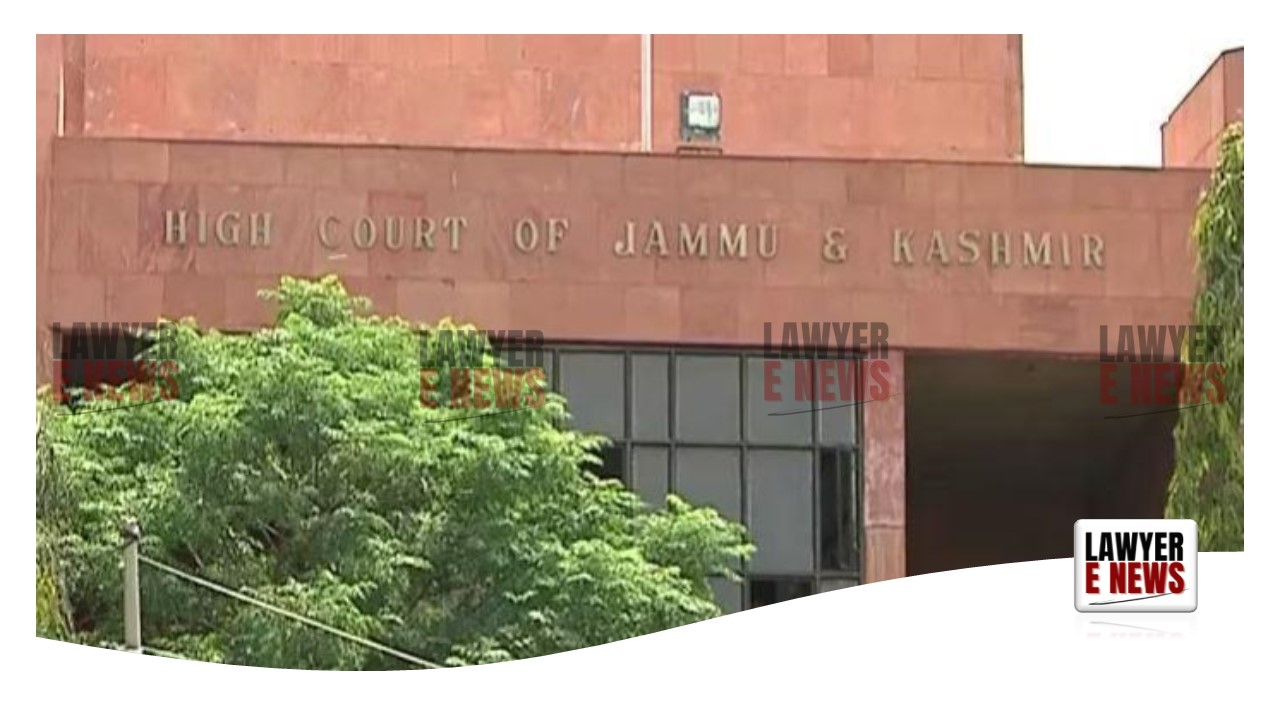-
by Admin
15 February 2026 2:36 AM



High Court of Jammu & Kashmir and Ladakh, through Justice M.A. Chowdhary, dismissed a habeas corpus petition filed by Manpreet Singh @ Sartaj in Habeas Corpus Petition No. 13 of 2024, upholding his preventive detention under Section 3 of the Prevention of Illicit Traffic in Narcotic Drugs and Psychotropic Substances Act, 1988 (PITNDPS Act). The Court found the detention order lawful, citing substantive evidence of the petitioner’s involvement in repeated drug trafficking activities that posed a threat to public safety. The Court also rejected allegations of procedural lapses and violation of the petitioner’s constitutional rights under Article 22(4).
The petitioner, Manpreet Singh @ Sartaj, was detained under Detention Order No. PITNDPS 66 of 2023, issued on December 9, 2023, by the Divisional Commissioner, Jammu, under the PITNDPS Act. He was lodged in District Jail, Kathua. The order was based on allegations of Singh’s habitual involvement in illicit narcotics trade, with three FIRs registered against him. The petitioner challenged the order on the following grounds:
Alleged non-application of mind by the detaining authority and reliance on vague grounds.
Concealment of material facts, including his acquittal in two of the FIRs and the fact that he was already in custody when the detention order was passed.
Denial of rights under Article 22(4) of the Constitution, alleging failure of the authorities to consider his representation against the detention order.
The State countered that the detention order was necessary as the petitioner’s activities posed a grave threat to public safety, and ordinary legal mechanisms had failed to prevent him from engaging in the narcotics trade.
The petitioner argued that the detaining authority had merely reproduced the police dossier without proper examination of evidence, and that the grounds of detention were vague. The Court rejected this contention, stating:
The detaining authority acted after careful examination of the dossier and other material, fulfilling the requirement of subjective satisfaction under Section 3 of the PITNDPS Act.
The allegations were supported by substantive evidence, including the petitioner’s involvement in multiple narcotics-related FIRs, justifying the preventive detention to curb further illicit activities.
“Preventive detention is justified when evidence demonstrates a clear and ongoing threat to public safety that cannot be mitigated through conventional legal processes.” – [Para 8]
The petitioner alleged that his representation against the detention order, filed on January 8, 2024, was neither considered nor was he informed of its outcome. The Court, after examining the records, found this claim to be unsubstantiated:
The representation was duly forwarded by the detaining authority to the Home Department, which rejected it after consideration.
The rejection was communicated to the Superintendent of District Jail, Kathua, who was responsible for informing the petitioner.
The Court held that the procedural safeguards under Article 22(4) were followed. “The petitioner’s right to make representation does not guarantee acceptance, but only obligates authorities to consider it in a timely and fair manner, which was duly done in this case.” – [Paras 11-13]
The petitioner claimed his detention was unjustified as he was already in police custody at the time of issuance of the order. The Court dismissed this argument, relying on precedents, including Haradhan Saha vs. State of West Bengal (1975), and observed:
Preventive detention is preventive, not punitive. Even if an individual is already in custody, a detention order can be passed if there is a likelihood of their release and a continued threat to public order.
“Involvement in the narcotics trade is a grave menace with far-reaching social and public safety implications, warranting preventive measures.” – [Paras 14-15]
Validation of Detention Order: The Court upheld the detention order, holding that it met the requirements of procedural fairness and substantive justification under the PITNDPS Act and relevant constitutional provisions.
Rejection of Procedural Challenges: The petitioner’s claims of non-application of mind, vagueness, and denial of rights were found to lack merit.
Public Interest Prevails: The Court emphasized the importance of preventive detention in combating the growing menace of drug trafficking, particularly its impact on the youth.
The petition was dismissed, and the detention order was upheld as lawful and necessary for maintaining public safety.
The High Court’s judgment underscores the legal and social imperatives of preventive detention in cases involving habitual offenders in the narcotics trade. While the right to representation under Article 22(4) remains a critical safeguard, the Court reiterated that procedural compliance, combined with substantive justification, validates the use of preventive detention as a tool to protect public safety.
Date of Decision: November 18, 2024
